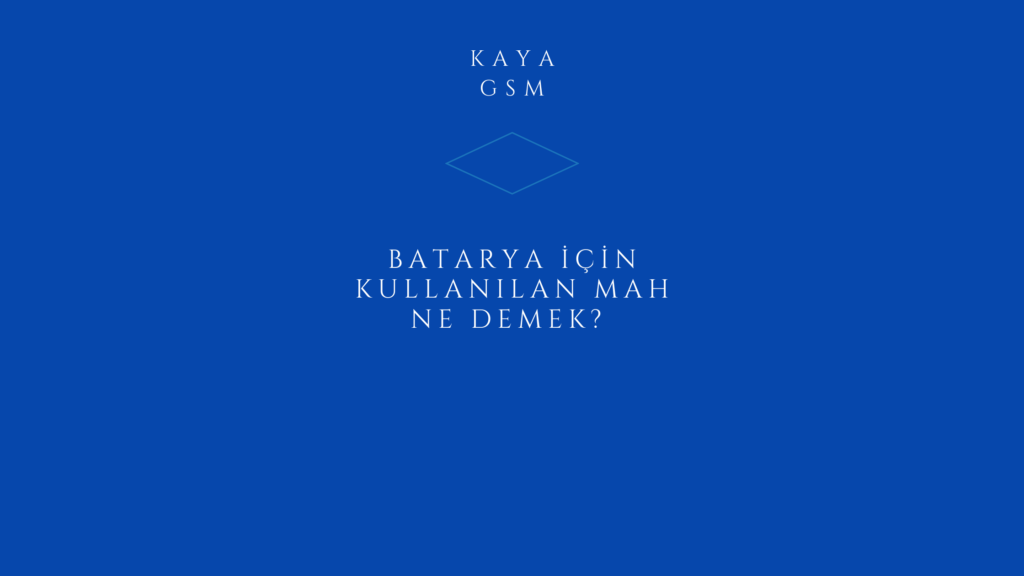What Does mAh Used For Battery Mean?
Battery Before moving on to our article, I would like to give some information about batteries. First of all, what is a battery?
What is a Battery?
Devices that directly convert chemical energy into electrical energy and store it are called BATTERIES. Batteries are divided into two groups: Primary (disposable or non-rechargeable) and Secondary (reusable or rechargeable).
These are batteries that mostly have the same chemical structure, dimensions and electrical capacity. Battery groups can be created by bringing them together one by one.
Signs on the Battery and Their Meanings
Battery Type: Abbreviations of the chemicals used are used depending on the chemical content of the battery or battery. Li-Ion, Cd, Zn-C, Al-Mn, NiCd, Ni-Mh etc.
Operating Voltage (V): While this value takes values such as 3.3V, 3.7V, 5V in mobile phones, it takes values such as 10.8V, 11.1V, 14.8V in laptops.
Capacity(mAh): It shows how much energy the battery can store per hour.
It provides information such as mAh value, battery capacity and how long it will take to charge. mAh The abbreviation stands for milliampere-hour. For example, when a 1500mAh battery is installed in a device that draws 100 milliamps, the battery will be discharged in 15 hours. However, a device drawing 150 milliamps can discharge the same battery in 10 hours. Mobile phone The higher this unit in the battery, the more energy the battery can provide for a longer period of time.
Looking at its terminological meaning, it is the current value calculated by the number of electrons transmitted per unit time. In other words, it tells us how many times the device we charge will be fully charged in relation to the mAh value.
Since the mAh value indicates the capacity, when high values such as 2000-3000 mAh are reached, it is seen that these devices are physically larger as they will need more energy storage. At the same time, when these spare batteries are consumed, the time required to recharge them varies in proportion to the mAh value. For example, a 1000 mAh device can be charged in an average of 1 hour, while a 2000 mAh device can be fully charged in 2-2.5 hours.
We can understand that the battery you will purchase is a rechargeable battery only from the numerical mAh value written on it. Because all rechargeable batteries have a mAh value as a number. The higher the mAh value here, the higher the life time of the battery until it is recharged. Your preference should always be to buy batteries with higher mAh values, which are more durable and have higher efficiency.
How is Battery Value Calculated?
Let the output value of the charger you have is 1.5A. With simple math, a battery with a capacity of 3000 mAh is charged in 3000 mAh / 1.5A (1500 mA) = 2 hours.
If it is a 3000 mAh phone, this is related to the energy consumption values of the phone. If your phone consumes 100 mA of energy when it is not being used, your phone's battery lasts for 3000 / 100 = 30 hours. This time will shorten depending on your phone usage. The screen consumes the most battery. If we detail the screen itself, the white color on the screen attracts the most energy. If you ask what consumes the most battery after the screen, it would be video, wifi, GPS, etc.
Lithium polymer battery used for mobile phones is used.
Lithium polymer battery: It has the basic characteristics of lithium batteries. The difference is that it has less charge density. The chemistry of this battery is that it can create a place of use advantage according to the manufacturer's requirements. (Example; ultra-thin battery) Mobile phones, smart cards, etc. are used.
As a result, the battery must have a high mAh value to prevent communication from being interrupted. It should have fast charging feature. Finally, if possible, original or close to original products should be used. In all these matters Kaya GSM wants to help you. Come on, we are waiting for you to have a coffee...

Thank you for answering my question in great detail
Thank you very much, it was a good article and valuable information shared.
Thanks for your enlightening information.